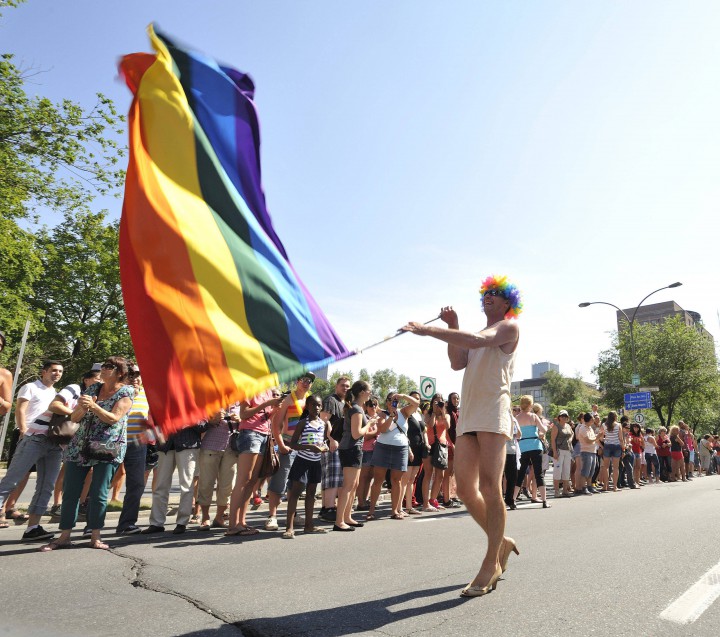MONTREAL – For some, it’s a week full of feather boas, glitter and sky-high platforms.

But for many in the LGBTQ community, Pride Week in Montreal is so much more than that – it’s the reiteration that their lives matter and their struggles are important enough to be spoken about and discussed on the global scale.
“We have brought about our freedom to be and live as we choose,” said Atif Siddiqi, an actress and filmmaker.
“It’s really our humanity that’s been changing the minds and hearts of people who know us.”
Siddiqi, who moved to Canada from Pakistan 23 years ago, has always considered herself to have an androgynous personality.
She knew she didn’t want to physically transition into a woman, but did have a feminine side, saying she only fully embraced her transgender identity about 12 years ago.
Siddiqi spoke about queer activists who have fought for equality and anti-discrimination who have truly changed the way society views the LGBTQ community.
“Attending Stonewall 25 in 1994 was a an important demarcation point in my life. That event in New York was my first pride parade and it touched me immensely,” said Siddiqi.
“I knew I was a part of history and someone who had to do something for our future through my artistic expression and by being true to myself.”
What’s the biggest misconception?
According to Jean-Sébastien Boudreault, Fierté Montréal‘s Vice-President, the biggest misconception about the LGBTQ community is that everything is going terribly.
“We fought for marriage, we fought for adoption and legal rights, it’s not all bad,” he told Global News.
What about trans rights?

Get daily National news
Gay marriage became legal in Canada 10 years ago, the fourth country in the world to do so, but it’s not making the same strides in terms of trans rights.
Earlier this year, Bill C-279, which seeks to fight hate crimes against transgender individuals, was gutted by the Canadian Senate.
“Once we have legal recognition, we have a basis to fight, we have the law behind us. We have to make sure that parliament makes that change,” Boudreault told Global News.
“I don’t understand why people are so afraid to protect one another. Why are we so afraid to give rights to someone when giving those rights would never take away yours?”
READ MORE: B.C. among few provinces without trans legislation
Boudreault pointed to positive role models like Caitlyn Jenner and Candis Cayne to bring a voice to trans issues.
“To take the flag, the torch and march in front of everybody and say ‘see, you can be trans and still be amazing at everything you do,'” he said, adding that their voices are just two in a sea of many.
He scoffed at people who insist Caitlyn Jenner is just an attention seeker.
“Celine Dion doesn’t represent all of Quebec and Oprah doesn’t represent the whole black community,” he told Global News.
“Caitlyn Jenner is just one voice representing her experience, her education. And a positive one at that.”
WATCH: Caitlyn Jenner accepted the Arthur Ashe Courage Award at the ESPYs on in July night while urging acceptance for others who are transgender.
Why the party?
Contrary to what many believe, Gay Pride Week is not just an excuse to dance in glittery outfits and feathers.
“Yes, there will be drag queens. Yes, there will be feathers, but it’s not the whole thing,” said Boudreault.
WATCH: The bigger picture of Pride Week
Throwing a party in the middle of a large, metropolitan city like Montreal is the first of many steps towards global social acceptance.
“It’s still an everyday fight,” said Boudreault.
“We have to make sure that it’s not only in the ‘gay area’ that we can be safe, that we can hold hands with our same-sex partner anywhere.”
READ MORE: Toronto Pride parade sees politicians, celebrities unite despite rain
Montreal, he pointed out, is one of the world’s leaders when it comes to LGBTQ rights and that’s why it’s so important to throw parties and parades – to keep the conversation alive.
“We brought someone from Kiev here and…she keeps on saying it’s overwhelming to not be afraid of who you are,” said Boudreault.
“That gives her the strength to go back to Ukraine and keep fighting.”
What’s the next step?
“The B and T in LGBTQ,” said Siddiqi – that is the bisexual and transgender aspect, as well as what she calls “the invisibles.”
“They are invisible because everyone thinks they are part of the mainstream and some do not assume their place in the LGBTQ community,” Siddiqi told Global News.
READ MORE: #OneTeam: Canadian Olympic Committee launches LGBTQ inclusion campaign
Similarly to the women’s movement and the movement for racial equality, activists hope there will be an end to their battle.
“It will end when people, especially kids, can grow up feeling and acting like others without having their gender and sexual orientation questioned,” said Siddiqi.
All the same, there is still a long way to go.
“That the rate of suicide between LGBTQ youth goes down because it’s way higher than in the straight community,” said Boudreault.
“I don’t think anybody alive today will see the day when everyone in this world will be fine, that everything is perfect.”
rachel.lau@globalnews.ca
Follow @rachel_lau







Comments